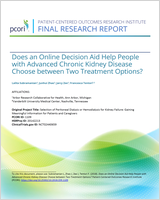|
No
| Developed infection on PD | “Well I had no choice. What happened was, when I was on the peritoneal … I got a really bad infection and developed a lot of scar tissue … so they tried to put it back in but it wouldn't work so I had to go on hemo.” [female, aged 45] | Negative side effects from HD | “[With] hemodialysis I was feeling so sick. I had all the headaches I didn't have energy to even walk to do anything and I looked so sick on it.” [female, aged 27] |
| HD was default choice | “So, it was more beneficial for me to go on hemo, which was the instant plan I started it the same day as they put the catheter in” [male, aged 45] | |
|
Combined decision
| Developed infection on PD | “I got peritonitis and … the surgeon told me that after he removed the second catheter for an infection, he told me my body didn't like the catheter and was rejecting it. So, because I was … frequently with infections, then it would be better for me to not do peritoneal.” [female, aged 57] | Convenience of home dialysis | “If I want to plug in at 3:00 in the morning and be plugged in until late the following day, it doesn't really matter I know it's something I have to do every day. At least I have the flexibility of when I want to do it.” [male, aged 27] |
| Too much time on machine with PD | “It was really my time … doing that every day for 12 hours … was rough.” [male, aged 39] | |
| PD makes you look like a patient | “I didn't want any tubes hanging out of my belly.” [female, aged 33] | |
|
Weak yes
| Medical Condition | “It [PD] was not an option. Because of surgery that I've had, the cancer in my abdomen So, it couldn't be done.” [male, aged 70] | Negative side effects from HD | “The hemo was giving me horrible headaches. The last couple days … it was making me sick. I couldn't tolerate it any longer.” [male, aged 56] |
|
Strong yes
| Fear of infection from PD | “To me, hemo just seems to be … more clean. Because the peritoneal, you have a lot of chances of getting infections, and I didn't want to do that.” [female, aged 52] | Better quality of life on PD | “I felt like the PD would allow me to have a normal life. Other than the dialysis … I could still go out, do everything.” [female, aged 43] |
| Want trained medical person | “While I'm doing my dialysis, I like the fact that there's someone there … that could help me if something went wrong or something like that. I don't know, I just feel more comfortable … going into the center and having it done there.” [male, aged 37] | Convenience of home dialysis | “Well, just the fact that I can do it at home. The idea of going into a center 3 times a week for 4 or 5 hours just absolutely does not appeal to me.” [male, aged 82] |
| Ability to work | “The fact that I was still able to work and take care of my family …” [male, aged 48] |
